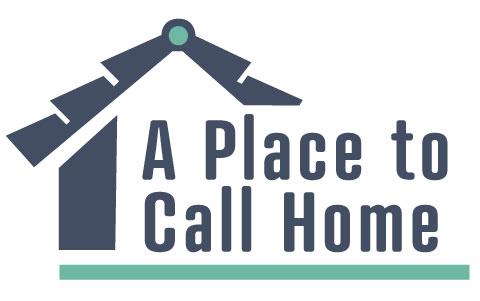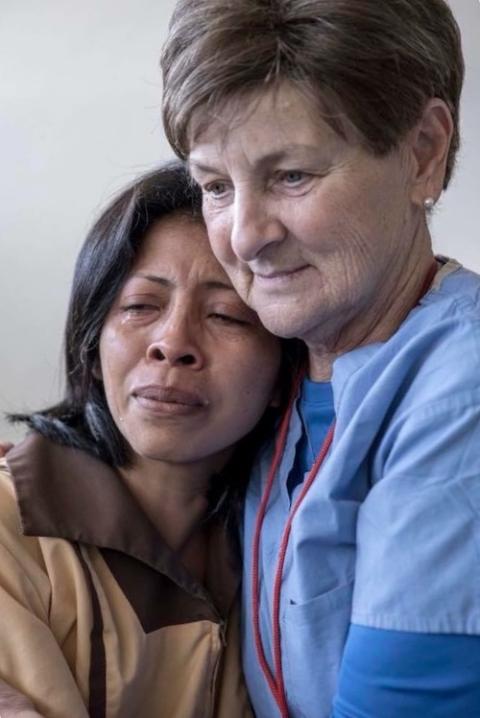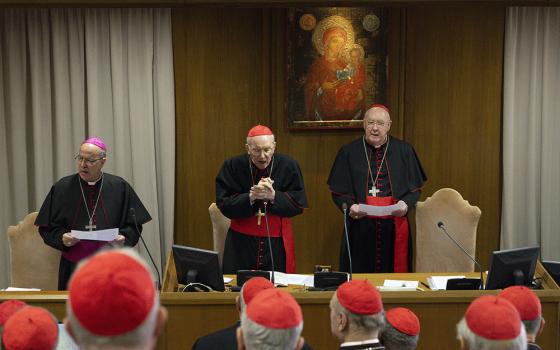
Sr. Susanne Hartung, left, serves immigrant families and people who are homeless at Providence Regina House in Seattle, which is one of her responsibilities, she said. Hartung and her many volunteers serve hundreds at Regina House every week. (Provided photo)
Editor's note: More than 1.6 billion people worldwide live in substandard housing. Of those, at least 150 million have no home at all. In this special series, A Place to Call Home, Global Sisters Report is focusing on women religious helping people who are homeless or lack adequate shelter. Over the next several months, we will examine how homelessness and a lack of affordable housing affect teens and young adults, families, migrants, the elderly, and those displaced by natural disasters and climate change, in stories from Kenya, India, Vietnam, Ireland, Puerto Rico, the Philippines, the United States and elsewhere.

(GSR/Toni-Ann Ortiz)
When the Sisters of Providence community had Sr. Susanne Hartung leave education to go into health care in 1987, it was out of necessity. She had previously spent 25 years teaching in Catholic schools, but "they realized, as a religious community, we needed people in mission formation, mission leadership" within the health care ministries, she said.
"We knew there was a critical position that was needed to help our lay partners become much more familiar with the mission and the fidelity to that mission," Hartung said, which for Providence St. Joseph Health in Renton, Washington, means serving people who live in poverty.
As the hospital's chief mission integration officer, Hartung was honored with the Health Care Leadership Inspiration Award by Puget Sound Business Journal on Dec. 6, 2019. The work that was recognized, which she credits to a larger team effort, includes expanding services to people who are homeless.
In conversation with Global Sisters Report, Hartung talks about serving the homeless community, ensuring that her congregation's charism remains central to the hospital's mission as laypeople inherit leadership, and her personal reflections from her 60-year jubilee.
GSR: I read that you challenged the Puget Sound community to be innovative in addressing the homelessness crisis. Can you tell me more about what that entailed?
Hartung: Eight years ago, we did a needs assessment at our system office, and I became the sponsor of this assessment. As we looked at the demographic, we realized that homelessness was a huge issue in Seattle; it's the city with the third-largest homeless population. So we developed a mission ambassadors program where our teams go out and serve the homeless primarily in food and clothing, but we also developed a program for the homeless who really want to work, providing scholarships for them to go to school and to learn a skill so they can become self-sufficient.
When I was asked to speak when I received the award, I said to the group of about 300 people, "I'm really passionate, and I'm very impatient." Seattle has definitely tried to address it — large corporations have given lots of money — but I'm very impatient with the fact that we don't have a clear strategy of how we're going to address homelessness. We're making lots of attempts at it, and there's goodwill, but I said to the group, "I'm asking everyone to do something to end homelessness. I don't know what exactly that is, but Seattle is probably the best economy in the United States, and we're able to build jumbo jets. Microsoft is here. We have an app for everything we need. We have a box on every doorstep. Amazon is here. And yet we don't have the mind to come together to end homelessness." That was my plea.
At this luncheon, we had the finest minds in health care, and everyone wants to do something. But I challenged everybody to get back at it and see what they can do.
Oh, and I should have said this earlier, but congratulations on receiving this award.
I have to tell you — this is not about me. I work with the most incredible people, and they really do want to serve the poor. One of the reasons we formed the mission ambassadors program is: Most people sit at their computers all day at the office, and they wanted to be out working with the poor.
We partnered with six different nonprofit agencies that have direct service to the poor. It's by team, and our president of operations, Mike Butler, has taken homelessness on. It's one of our initiatives at Providence, and we're doing everything we can as a system to have an impact on the homelessness situation.

Sr. Susanne Hartung, third from left, with fellow Sisters of Providence upon receiving the Health Care Leadership Inspiration Award by Puget Sound Business Journal on Dec. 6, 2019 (Provided photo)
Since the award, we almost feel like we have more work to do. Mother Joseph and our sisters never knew what they were going to do when they came out West, and every century or decade, it feels like there's a new community need. And in Seattle, right now, it's homelessness. We have to attend to the needs of the time and address them.
How do you make sure the concern for, in your case, the charism of serving the poor remains an active part at Providence St. Joseph Health as sisters pass on the reins of leadership?
Our mission statement is an expression of God's healing love revealed through the ministry of Jesus, who is steadfast and serving all, especially the poor and vulnerable. The Sisters of Providence out of Montreal have been at this for 175 years, and we have never changed our mission. We're one of the rare, I would say, corporations that have never faltered. We treasure that history, and we realize that to continue it, we have to pay close attention to the formation and mission integration with our laypeople.
I have many different aspects of my role, but I started out primarily in ethics, particularly medical and business ethics. From that, I also became very aware that we want to be sure we hire well. That's primary: that we understand who it is we're hiring in leadership and that they have a real sense of dedication to the poor and vulnerable, and that whatever they do in administration or leadership, no matter what decisions they make, it's all for the betterment of the community and for the poor.
From there, these leaders are put into a two-and-a-half-year formation program. We consider every single one of our leaders to be mission leaders themselves. We want them to understand theology, Catholic health care, our history. We help them understand how to make ethical decisions in whatever areas they need, to make either a tough decision or an innovative decision. It's a lot of education, formation, and a lot of inspiration.
Advertisement

To celebrate her 60-year jubilee, Providence Sr. Susanne Hartung, right, joined the Sisters of Providence's international group in Guatemala, where they set up a temporary hospital to minister to local villagers. (Provided photo)
You've said before that your fundamental belief is: "To know the poor, you have to serve the poor." I'm curious how this ministry has helped you know the poor or how it has shaped or inspired other core beliefs you have.
You can talk about the poor, but unless you talk to them, you serve them, you understand them, you really don't know them. I encourage my team not just to serve them food or clothing, but to talk to them.
At an early age, my mother taught me to always speak to someone who is homeless, so I never go by anyone on the street without saying "good morning" or recognizing their existence. It gives them dignity. Our people can say they're dedicated to the poor, and I think they are, and sometimes, they give money, which is wonderful, but I think we absolutely have to serve them and touch them in a way that we would never as we sat at a computer. You have to go out and serve. You can say, "I give money," which is great, but I don't think we know the poor simply by giving money to an organization.
I have 20 leads, as I call them — directors, financial analysts, everything we do in a systems office — and they tell me they come to work because they love so much the work they're doing with the poor. Many of them were crying at the award ceremony, saying, "We're just so lucky to get to do this because this feeds our soul as well as helping humanity in some way." It's given them a huge ability to express more fully who they are as caregivers at Providence.
You also recently celebrated your 60-year jubilee. Tell me about some reflections you had around that celebration or if it got you thinking about your time in religious life in a new way.
I belong to a marvelous religious community who inspire me continuously. I had a life-threatening illness, and I'm a miracle to be alive, and what I did to celebrate my jubilee is, I went with our international group to Guatemala. I was there for 10 days and served with our team in this surgical center for the poor who actually come down from the mountains, and they are doing surgeries that have been pending for years. For me to be part of that team was a sense of gratitude, first of all, that God gave me a new lease on life. I'm 80 years old and probably have the energy of a 50-year-old still working full-time, and I don't intend to quit. I'm truly blessed beyond measure.
[Soli Salgado is a staff writer for Global Sisters Report. Her email address is ssalgado@ncronline.org. Follow her on Twitter: @soli_salgado.]







